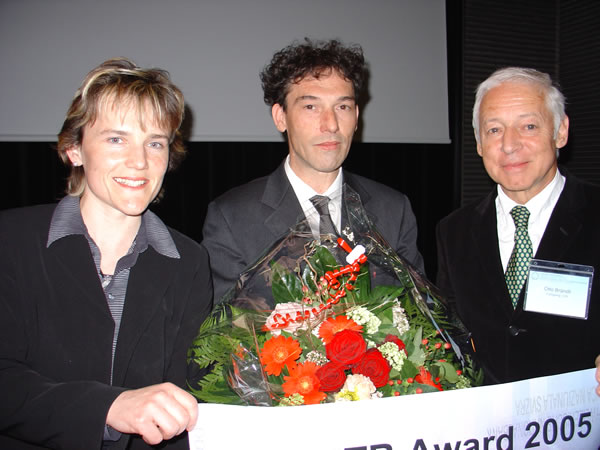swissTB award 2005
Drs. Liem Nguyen, Anne Walburger, Giorgio Ferrari, Anil Koul

Dr. Giorgio Ferrari nimmt den SwissTB Preis 2005 an der offiziellen Feier im KKL Luzern von SwissTB Präsident Dr. Otto Brändli in Empfang.

Dr. Liem Nguyen

Dr. Anne Walburger

Dr. Giorgio Ferrari

Dr. Anil Koul
Am Welt-Tuberkulosetag 2005 vom 24.03.2005 wurde zum vierten Mal der „Swiss TB Award“ im Betrag von Fr. 10'000.-- an die vier Erstautoren der folgenden Arbeit verliehen: Walburger Anne, Koul Anil, Ferrari Giorgio, Nguyen Liem, Prescianotto-Baschong C., Huygen K., Klebl B., Thompson C., Bacher G., Pieters J.:
Protein kinase G from pathogenic mycobacteria promotes survival within macrophages. Science 2004; 304: 1800-4.
Die vier Preisträger haben mit dieser bahnbrechenden Arbeit aus dem Biozentrum der Universität Basel eine Möglichkeit aufgezeigt, wie die Tuberkulose besser behandelt werden könnte. Der „Swiss TB Award“ wird jährlich für die beste Forschungsarbeit auf dem Gebiet der Tuberkulose durch die Schweizerische Stiftung für Tuberkuloseforschung verliehen.
A novel drug target to overcome intrinsic antibiotic resistance of Mycobacterium tuberculosis
Liem Nguyen1, Anne Walburger1, Giorgio Ferrari1, Anil Koul2
1Biozentrum, University of Basel, Basel Switzerland, 2Axxima Pharmaceuticals, Munich, Germany
Mycobacterium tuberculosis is responsible for the most mortality world wide as a single infectious agent. Chemotherapy of this disease is hampered by the inaccessibility of the mycobacterial cell wall, which renders high resistance of this bacterium to almost available antibiotics. In this proposal for the SwissTB award 2005, we present our discovery of a mycobacterial protein kinase that could be used for the development of novel anti-mycobacterial compounds circumventing the inherent problem of mycobacterial cell wall as a barrier for chemotherapy.
Background: The first barrier a microbial pathogen has to face when infecting multicellular organisms is the innate immune defense system in which a key player is the macrophage. These “professional phagocytes” recognize microbes and engulf them into vacuoles called phagosome. Phagosomes then fuse with lysosomes, resulting in the degradation of the cargo by resident hydrolytic enzymes. In contrast to what happens with other microbes, Mycobacterium tuberculosis can prevent the fusion of their phagosomes with lysosomes, thereby surviving intracellularly. We identified a secreted mycobacterial protein kinase, protein kinase G that plays crucial role for the blockage of phagosome-lysosome fusion. Genetic disruption of this kinase results in immediate transfer of mycobacteria to lysosomes and consequent mycobacterial cell death. A chemical screen for protein kinase G inhibitors led to the discovery of a tetrahydrobenzothiophene, which specifically inhibits the kinase activity of protein kinase G. This compound, as expected, accelerates the phagosome maturation process and mediates enhanced bactericidal activity of macrophages against Mycobacterium tuberculosis.
Significance: Most anti-tuberculous antibiotics used today intend directing intracellular mycobacterial targets to stop Mycobacterium tuberculosis growth. Instead, targeting protein kinase G would allow the macrophage to carry out its innate anti-bacterial activity by shuttling the bacterium to lysosomes. Moreover, by targeting an extracellular functioning molecule like protein kinase G, the problem of chemical transportation through the inaccessible mycobacterial cell wall could be avoided.
Publikation
Walburger A*, Koul A*, Ferrari G*, Nguyen L*, Prescianotto-Baschong C, Huygen K, Klebl B, Thompson C, Bacher G, Pieters J. Protein kinase G from pathogenic mycobacteria promotes survival within macrophages. Science. 2004 Jun 18; 304 (5678):1800-4.
(* Note that these authors contributed equally to the work).
